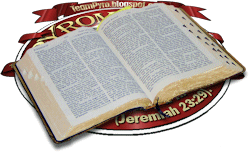NOTE: in case you're interested, I reviewed the NICOT/NT in Olive Tree software at my site, yesterday.
 An aside: seriously, pastordude, studentdude — you really ought to read out of your own little parochial circles. Sure, many writers (::cough::McLarenBellCampoloEtc::cough::) may be a pure and utter waste of time, but you really should let your thinking be stretched and challenged among Biblically faithful, godly, deeply thoughtful writers.
An aside: seriously, pastordude, studentdude — you really ought to read out of your own little parochial circles. Sure, many writers (::cough::McLarenBellCampoloEtc::cough::) may be a pure and utter waste of time, but you really should let your thinking be stretched and challenged among Biblically faithful, godly, deeply thoughtful writers.Such as John Frame.
The accolades from men such as Carson, Piper, Mayhue, Pratt, and Kelly are well-deserved. J. I. Packer calls the volume both "magisterial" (xxiii) and "pastoral" (xxiv) in the Foreword, and both are appropriate.
Let's take an overview. Imagine this — a book on Scripture that begins with two pages of Scripture lauding the excellencies of Scripture, which then is crowned by the simple profundity of the well-known song that begins, "Jesus loves me, this I know, For the Bible tells me so."
Then Frame provides a ten-page outline of the entire book, minus appendices (xiii-xxii). This is a helpful aid in keeping the shape of the forest in mind, whilst wandering amid the trees Prof. Frame points out for us. It is a singular feature; more authors should follow suit.
The next actually caught me by surprise. In the Table of Contents, one notices that Frame provides appendices. A lot of appendices. They run the alphabet from A to Q. How much of the book does that end up involving? This much:
That's right: on the left is the text, on the right, the rest. In a 684-page book, the text ends on p. 334. The rest is comprised of appendices, bibliography, and three indices. (No endnotes! Footnotes! Frame and P&R love and respect their readers!)
This is not a criticism, as the appendices provide worthwhile interaction with books, articles and movements, applying Frame's perspective to specifics such as issues of antithesis and rationality, charges of Biblicism, questions of the place of Christ and the Spirit, matters of worship and traditionalism, Dooyeweerdianism, and particular influential authors such as John Wenham, Peter Enns, and N. T. Wright.
As to the text itself, I was informed, challenged, and greatly helped. Several of Frame's insights had an impact on the way I presented the word of God in my first sermon series at CBC.
For readers new to Frame, here's what you can expect: he is (I'd say) a brilliant man who constantly interacts with Scripture in a very lively, thoughtful, probing manner. He is deep, yet readable, and he's greatly helped me think through some issues.
 My favorite Frame anecdote was actually supplied by a friend, who shared about his father visiting him at seminary. One of my friend's roommates asked his father, “Were you in the same class as John Frame?”
My favorite Frame anecdote was actually supplied by a friend, who shared about his father visiting him at seminary. One of my friend's roommates asked his father, “Were you in the same class as John Frame?”My friend's dad paused a moment, then responded, “No one was in the same class as John Frame.”
Back to the book.
Frame treats of Scripture's self-testimony well and at length. He identifies the "main contention" of his book thus:
God's speech to man is real speech. It is very much like one person speaking to another. God speaks so that we can understand him and respond appropriately. Appropriate responses are of many kinds: belief, obedience, affection, repentance, laughter, pain, sadness and so on. God's speech is often propositional: God's conveying information to us. But it is far more than that. It includes all the features, functions, beauty, and richness of language that we see in human communication, and more. ...My thesis is that God's word, in all its qualities and aspects, is a personal communication from him to us. (3)He develops Scripture as necessarily evocative of a wide variety of responses as befitting the individual texts, including belief, obedience, delight, repentance mourning (4). Scripture has inherent authority, which he defines as a "capacity to create an obligation in the hearer" (5)
So in Scripture God speaks, He speaks to us, and He speaks as Lord. His word is authoritative, and we are obliged by a wide variety of genera to respond in a wide variety of ways. God's whole word engages the whole man.
 Frame then moves to identify the shocking defection of scholars and (then) pastors from that Biblical position. I've never seen a fresher, better analysis and representation of the Academy's betrayal. He says it began with the assertion of "intellectual autonomy" or "autonomous reasoning," with the corollary assumption that "anyone who disagreed was simply not a scholar, not qualified to do serious research" (19).
Frame then moves to identify the shocking defection of scholars and (then) pastors from that Biblical position. I've never seen a fresher, better analysis and representation of the Academy's betrayal. He says it began with the assertion of "intellectual autonomy" or "autonomous reasoning," with the corollary assumption that "anyone who disagreed was simply not a scholar, not qualified to do serious research" (19).The effects of this seismic shift came quickly and suddenly into the church:
It all happened very quickly. There was no academic debate on whether it is right for human beings to exercise reason without the authority of God's revelation. There was not much argument about whether the universities should change their time-honored commitments to divine revelation. Rather, major figures simply began teaching from the new point of view, and there was no significant resistance. They accepted the assumption of autonomy and saw to it that their successors accepted it, too. ...The conservatives did not know what hit them. (19)Further:
This change was astonishing. The adoption of intellectual autonomy as a theological principle was certainly at least as important as the church's adoption of the doctrine of the Trinity in 381, or the doctrine of the two natures of Christ in 451. Yet without any council, without any significant debate, much of the church during the period 1650 to the present came to adopt the principle of intellectual autonomy in place of the authority of God's personal words. But this new doctrine changed everything. Given intellectual autonomy, there is no reason to accept supernatural biblical teachings such as the doctrine of the Trinity and the two natures of Christ. The virgin birth, miracles, atonement, resurrection, and glorious return of Jesus are on this basis no longer defensible. (20)One more:
...if human reason is autonomous, the God of the Bible does not exist, for his very nature as the Creator excludes the autonomy of his creatures. And in fact nothing at all can be validated by autonomous reason, for...such reasoning leads to a rationalist-irrationalist dialectic, which destroys all knowledge. For that pottage, much of the church has forsaken its birthright, God's personal word. (20)The rest of the book proves this from Scripture, develops it, and applies it.
In the course of this feast, Frame deals with propositional truth, authority, inerrancy, sufficiency, transmission, and translations. Let me just single out two more favorite points from the book, and finish by (surprise) recommending it heartily.
 Frame faces head-on the charge that, since we don't have the autographa, inerrancy is irrelevant. He explains that inerrancy does not adhere to a particular sheet of papyrus, but to the text written on that sheet. From this, he argues that, while we do not possess the autographic manuscripts, we do indeed present the autographic (and therefore inerrant) text of Scripture.
Frame faces head-on the charge that, since we don't have the autographa, inerrancy is irrelevant. He explains that inerrancy does not adhere to a particular sheet of papyrus, but to the text written on that sheet. From this, he argues that, while we do not possess the autographic manuscripts, we do indeed present the autographic (and therefore inerrant) text of Scripture.Quoting Greg Bahnsen with approval, Frame notes that the autograph is "the first completed, personal, or approved transcription of a unique word-group composed by its author," certified by the author in some way, such as sending an epistle to a church (241). Again, "The autographic text has been almost entirely preserved, accessible through manuscripts available to us and through the science of textual criticism" (252, emphasis original). What is more, "The distinctive teaching of the Scriptures has been entirely preserved, given the beneficial redundancy of doctrinal teaching in Scripture" (ibid, emphasis original).
That thought was immensely helpful to me. The other particular emphasis that stayed with me is found throughout the book, not easily reducible to one quotation. It is that God is present to me (and to His people) in His word. In His word He draws near, He speaks personally, and He exercises His Lordship. Tis affects me as a Christian, and as a preacher of God's Word.
The only disappointment I had was in his chapter on the Canon (133-139). It isn't that Frame's work is not helpful; it is. But my unreasonable expectation was that Frame would answer all my questions, but instead he understandably notes that "The present volume cannot enter into the details of this debate," and since this volume "is a systematic theological treatment, not a historical study" (135), he doesn't get fully into the issue. I would say that in this, Frame is a victim of my high estimation of him.
John Frame's The Doctrine of the Word of God is a challenging, informative, forceful and helpful book. I highly recommend it.
NOTE: this book was provided by P&R as a review copy.













17 comments:
Firstly, footnotes are the most caring thing a publisher can do for avid readers. That alone stacks in its favour.
On a more serious note, I got to read the lecture outlines from his course of the same name at RPM and it was so edifying. Lord willing, I'll add this to the arsenal :)
Your description makes me want to get this book right now. The doctrines related to scripture are some of my favourite; that is, if it's okay to say we have favourite doctrines.
Frame's book is a must-have; great rejoinder to Barth and his influence. As for the Canon issue, have you checked out Michael J. Kruger's "Canon Revisited"? Frame says its the most recent book on the subject he recommends most. It's been an immense help to me in answering canon questions. I'm recommending it to anyone who cares to listen.
By the way, I'm Nate, Colleen's husband. Can't figure out how to change the ID in Google. Sorry for any confusion.
I figured it was just another one of our many sharp female readers.
I do have that book, and have heard good things about it, but have not yet read it. I am glad for the recommendation.
This sounds like an essential library addition. Thanks for the review!
I recommend all four of Frame's "Doctrine" books. I warn you that some of his paradigms and phraseology slowly work their way into your speech/thinking. What he says in three sentences, takes me thirty. (Three is very important to Frame.)
"...if human reason is autonomous, the God of the Bible does not exist..." - Frame
Yes, yes yes!
When an atheist says, "I don't believe God exists and I don't believe the Bible. So let's meet on neutral ground and weigh the evidence for God and the Bible", too often I have heard the evidential apologist say, "Sure. Let's put our Bible on the shelf and discuss the evidence."
In doing so, and if I've read Frame right, then you have not only put your only weapon on the shelf, but you have just conceded to being an atheist in a sense. There is no neutral ground.
The authority of the Bible must never be put aside for human reason (although I do believe the Bible will always coincide with reason, but reason is not the starting point).
This book looks very interesting. Good review, Dan. Another book I might have to add to my reading list!
It's like saying to Eve, "Okay, let's set aside what both God and the Serpent say about that fruit and come to our own conclusion about it."
Game
Over
Yup. Well said.
Fantastic! I'm teaching an adult Sunday School class going through our statement of faith, and we just discussed Scripture the last two weeks--inspiration, whether Scripture "contains" or "is" the Word of God, inerrancy/infallibility/trustworthiness, sufficiency & clarity, etc. And I'm putting together a "further reading" list to email everyone.
This review and the book will be a fantastic addition. Especially the parts about "a book on Scripture that begins with two pages of Scripture lauding the excellencies of Scripture", and "Frame treats of Scripture's self-testimony well and at length", and the "main contention". ("Scripture's self-testimony" was obviously a big part of the discussion.)
Thank you very much, Dan!
"seriously, pastordude, studentdude - you really ought to read out of your own little parochial circles."
As an Orthodox Christian, I concur with this statement. While I have read writings of Schmemann, Hopko, Pelikan, Romanides, and of course many of the ECF (to mention a few), I also have read writings of Owens, Edwards, Luther, Whitefield, Wesley, Calvin, Lewis, and several others outside my parochial circle. Such an endeavor can expand one's horizons. For me, I have come to appreciate the various issues with which Christians from different faith traditions have had to struggle. And despite differences among Christians of good faith, God granted them the grace to affirm the Holy Spirit at work among those who were not of their parochial circle - such as Whitefield's deep love and respect toward Wesley, a man with whom he had much contention.
Glad to hear you still read some Christian writers, Nonna.
To be clear, I said "Biblically faithful, godly, deeply thoughtful writers." That was a filter that would exclude Mormon, Roman Catholic, Orthodox, Christian Science, and the like, apart from some special point of research.
This isn't a symposium on Nonna-ism, concerning which we've heard quite a lot, and many, many times.
So: John Frame, DWG, great book. Bible, God-breathed and wholly-sufficient, all 66 books.
DJP, Nonna-ism...you've coined a phrase for me! But really, I am insignificant in comparison to the giants of the Christian faith. Anything I am that might glorify Christ is due to His magnificent love, mercy, and grace.
One question: in regards to the autograph issue. Is this in reference to many Christian theologians/pastors (Sproul being one of them) stating that the Scriptures are inerrant in their original manuscripts? If I'm understanding this correctly (not sure and the reason I ask) does this mean that there are those who think the translations of the Scriptures (KJV, RSV, ESV, NIV, etc) are not inerrant?
Leaving aside names, yes, the issue is the statement of inerrancy. When we Christians say that we believe that the autographs are inerrant, then agree that we do not currently possess the original manuscripts, non-Christians attempt an "aha." Frame makes clear that we shouldn't give the impression that the original sheet of papyrus (or whatever) is God-breathed; it is the original text that is God-breathed. And we do possess that text, though we don't yet possess the original material on which it was recorded.
Frame does discuss translations. I'm sure everyone who follows my recommendation will find his discussion profitable.
Post a Comment